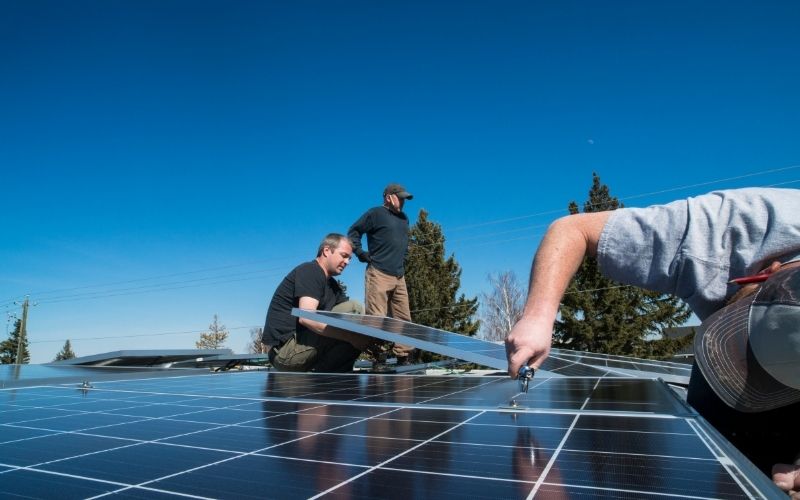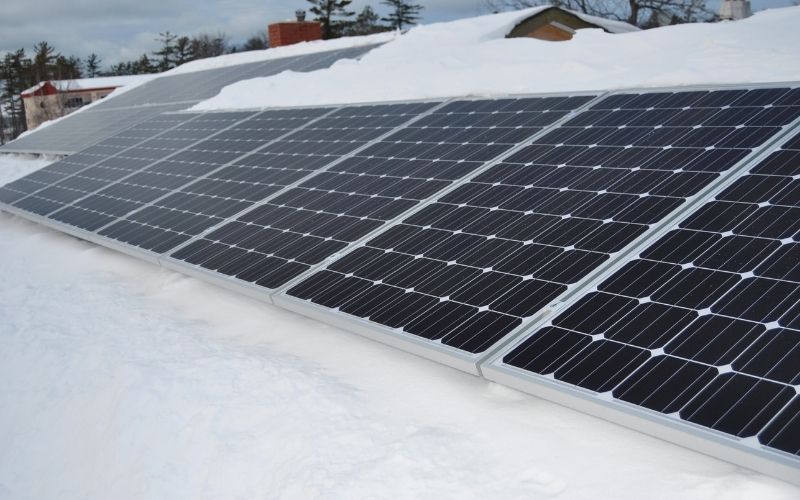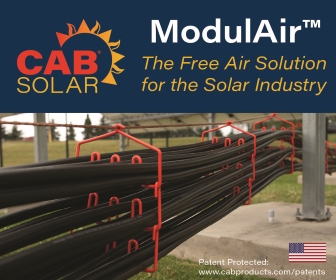Solar Customers’ Top Weather Complaints and How to Address Them
Nearly half of all solar customer reviews that specifically mention weather-related incidents are negative (e.g., three stars or fewer). Among these negative reviews, the most frequently mentioned weather issues include the following:
- Installation errors that contribute to roof leaks during rainy weather
- Damage to the roof, gutters, and other property from snow-laden solar panels
Roof leaks that occur after a solar panel system has recently been installed on a home are typically just the beginning of many problems for homeowners — they also have trouble getting support from the installing company:
“Currently have a leak in my roof where the solar is located. Reached out to have someone come out to do an inspection to see if the solar caused the leak or not. They pushed my inspection out a full month. What used to be a bubble in my ceiling is now a large crack allowing water to pour into my house when it rains.”
“The solar system I purchased a year ago is generating solar energy, however the roof tiles that were broken by the labor crew caused a major water leak in my ceiling. And, [the company] refused to take responsibility.”
“Poor solar panel installation caused a leak in my roof. It has been 5 months of continuously trying to get the company to remove the panels so that repairs could be made. The leak is so bad that it has gone into the first floor and water is pooling in my light fixture.”
Post-install roof leaks can be attributed to either of the following:
- Incompatible or old roofing - Not all roof types are compatible with a roof-mounted solar system. Shingles and tiles made from hard materials like wood, clay, or slate are not ideal. Additionally, roofs that are 30 years or older are especially prone to leaks when a solar panel system is installed. Many customers may need to have their roofs replaced prior to going solar.
- Subpar installation - A large portion of roof leak complaints are from customers who had their systems installed by subcontractors with limited experience. While this may seem like a money-saving option for companies, it could damage their reputation when problems like these arise.

Solar panels are designed to sustain a massive amount of pressure — sometimes up to four feet of snow on a single panel. The main concern for most solar owners living in snowy climates is with the buildup of snow itself either sliding off the panels all at once, or interrupting panel performance:
“This winter, after heavy snows, ice and snow slid off the panels onto my car parked in the driveway causing thousands (of dollars) of damage to my vehicle. I emailed [my solar provider], and first they said they had never heard of this issue, and then stopped responding.”
“The installation was very well done. However, they recommended a pole to take off the heavy snow and it hasn't worked . . . The panels cause snow to build up on the roof and it is extremely difficult and dangerous to shovel off.”
“Problems started with the first snowstorm of the season which was 3 inches…. the snow/ice started to slide off the roof and bent my gutters. The second snow storm of the season was 10 inches. As the snow/ ice started to melt, it slid down my roof, ripping the gutters off my house.”
 For many homeowners, snow is inevitable; in most cases, it will pose no threat to system performance or the property. If you install systems in snow country, keep the following in mind:
For many homeowners, snow is inevitable; in most cases, it will pose no threat to system performance or the property. If you install systems in snow country, keep the following in mind:
- Recommend snow guards for high-risk roofs: Usually, low-pitched roofs of composite shingles are considered low-risk for “avalanche-style” events; however, roofs of varying pitches and materials could benefit from snow guards. If you recommend snow guards, be sure to do so during the initial consultation rather than after an incident.
- Don’t leave shoveling to amateurs: Homeowners often don’t know that any system damage caused by their own efforts to clean snow from the panels is not covered under warranty. Remind customers that, most of the time, snow will melt off the panels on its own. For cases where performance is severely affected by the pileup, clearly outline your company policy around panel cleaning.
Rake through any number of solar customer reviews, especially reviews regarding the extreme weather, and you’ll find a throughline: positive weather-related reviews typically come from homeowners who’ve had a positive customer support experience. Rain and snow are unavoidable, but being available and responsive to customers is just as important as preventing water and snow damage in the first place.
Jordan Grimmer covers the solar beat for Best Company, a consumer resource for verified customer reviews of trusted companies.
Best Company | bestcompany.com
Author: Jordan Grimmer
Volume: 2022 May/June











.png?r=1258)
